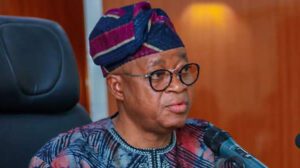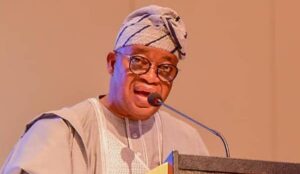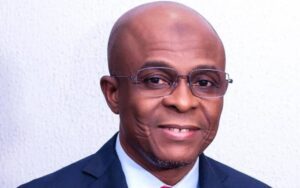
Oyetola and the task of harnessing economic benefits from Nigeria’s $296bn Blue Economy
As President Bola Ahmed Tinubu announced the unbundling of the Ministry of Transportation by creating Ministry of Marine and Blue Economy. In this report, SEUN IBIYEMI examines task of harnessing economic benefits from Nigeria’s $296 billion blue economy before the new Minister, Gboyega Oyetola
Following the announcement the appointment of Gboyega Oyetola, as the Minister of Marine and Blue Economy, a ministry that will be saddled with the task of harnessing Nigeria’s potential in the maritime sub-sector of the economy.
The Marine And Blue Economy Ministry, which had over the years been under the Federal Ministry of Transportation, had suffered undue attention as Former president Muhammadu Buhari administration focused more on the rail aspect of the ministry’s responsibility, thereby leaving many stones untouched as the nation continued to suffer losses in revenue from its blue economy sub-sector.
However, with a separate ministry now handling core maritime issues, following the creation of the Ministry of Marine and Blue Economy, expectations for deliverables are high as the new minister sets out to face the task of harnessing the nation’s maritime potential.
Over the past 10 years, the phrase ‘Blue Economy’ has gained popularity as more people, governments and economists have come to understand the enormous possibilities that the ocean and its resources present. The concept, blue economy, can be traced to Gunter Pauli’s 2010 publication and its currency gaining status at the 2012 United Nations Conference on Sustainable Development in Rio de Janeiro, Brazil.
The Blue Economy concept aims to market economic processes and social inclusion, hence the preservation or enhancement of livelihoods while also protecting the seas and coastal areas environmental properties.
The concept is therefore a cohesive and deliberate sustainable development plan that strives to integrate the ocean into all levels of an economy. Even as the oceans are exploited for economic gains, its sustainability is always emphasised.
Fishing, coastal leisure and tourism, shipbuilding, seawater desalination, offshore oil and gas and shipping are some of the economic activities in the traditional sector. But more recently, new industries have emerged in deep sea mining, biotechnology, aquaculture, seabed extraction, offshore renewable energy and blue carbon sequestration.
The Blue Economy has tremendous economic promise and capability. The Organisation for Economic Cooperation and Development has estimated that oceans contribute $1.5trillion to the global economy annually and has an estimated asset value of $24trillion. More so, the livelihood of nearly three billion people depends on ocean resources. According to estimates from the African Union, the blue economy currently brings in $300billion for the continent and supports 49 million jobs.
Blue economy has a huge importance to national development, especially for a maritime nation. It goes beyond shipping as well as oil and gas, to encompass all the activities that involve harnessing ocean resources including fishery, renewable energy, offshore power, support network and repairs.
According to data from the Nigerian Maritime Administration and Safety Agency (NIMASA), it is estimated that Nigeria’s untapped blue economy potential is valued at $296 billion.
This shows that sustainable exploitation of resources in the blue economy can lead to job creation, improved food security, tourism and infrastructure development, and green energy, among others.
“Sustainable exploitation of the blue economy resource will not only help Nigeria to generate revenue but to create employment for Nigeria’s growing population. Nigeria now has a ministry that is focused on realising the potential of the blue economy, and the government needs to create an enabling environment for private investment to thrive,” Abdul-Kadir Ahmed, managing director/CEO of NLNG Shipping and Marine Service Limited said.
Most importantly, the Blue Economy can be driven effectively by private operators, but Ahmed believed that it is critical for the government to strengthen regulations and oversight functions that will ensure safety in line with international standards.
The following setbacks are core for the minister of marine and blue economy as he sets out to make an indelible mark in the nation’s maritime industry:
Disbursement of CVFF
The Cabotage Vessel Financing Fund (CVFF) is a fund domiciled in the Cabotage Act 2003. Its primary aim is to improve indigenous tonnage in terms of capacity in order for Nigerian ship-owners to compete favourably with their foreign counterparts.
Since the enactment of the Cabotage Act in 2003, the CVFF, which has now accrued to around $700 million (dollar component) has not been disbursed for once, leaving many indigenous ship-owners to lack adequate capacity to compete in the cabotage regime.
With many indigenous vessel owners lacking capacity, Nigeria is currently suffering huge losses in terms of capital flight loss as a result of the dominance of the nation’s cabotage regime by foreign vessel owners.
The establishment of a new ministry solely in charge of marine and blue economy means that much emphasis will be placed on the prompt disbursement of the CVFF fund to indigenous ship-owners, giving the fact that the last administration of President Muhammadu Buhari had already carried the disbursement process up to a logical stage, with five Primary Lending Institutions (PLI’s) already identified.
With the $19.5 billion Dangote refinery already working and preparing to hit the market with its first product, the new minister must, as a matter of urgency, see to the address of inadequate indigenous capacity among local ship-owners in the country.
Single Window
The Nigerian maritime sector is due for a single window platform where functions of all government agencies operating at the nation’s ports are domiciled in one single document.
Port users over the years have been subjected to rigorous port processes that have led to payment of huge fees because the port is housed to many agencies of government, answerable to different ministries, both at the federal and state level.
Due to a litany of government agencies answerable to different ministries of government, many issues till date have remained unresolved. Notable amongst such issues plaguing the ports are prevalence of overtime cargoes at the nation’s ports, amongst others.
While the Nigeria Customs Service (NCS), the agency of government that has the final say on evacuation of overtime cargoes from the ports, answers to the Federal Ministry of Finance, the Nigerian Ports Authority (NPA), the agency that feels the pain of the menace of overtime cargoes inside the port, used to answer to the Federal Ministry of Transportation until now due to the creation of the Federal Ministry of Marine and Blue Economy.
With agencies like Customs, NPA, Nigerian Immigration Service (NIS), Nigeria Agricultural Quarantine Service (NAQS), National Agency for Food and Drug Administration and Control (NAFDAC) and the Nigerian Drug Law Enforcement Agency (NDLEA) all domiciled in the ports but answering to different ministries of the Federal Government, port users have been exposed to all sorts of irregularities in terms of payments during cargo clearance processes.
With a new ministry solely in charge of maritime, expectations are now high on the new minister to push for the establishment of a single window platform that will eradicate human-to-human interface at the ports while, at the same time, collapsing the different functions of all the government agencies inside the ports under one document.
Ports Development
The state of decay of many ports in Nigeria is already alarming, especially the Tin-Can Island Ports in Lagos. The Nigerian Ports Authority (NPA), for most part of late 2022 and early this year, have been raising alarm that the ports need complete rehabilitation.
Managing Director of the NPA, Mohammed Bello-Koko, during an interview, said there is imminent collapse in the ports if nothing is done in the next few years.
According to the NPA MD, “Our estimate on what we need to repair at the ports is currently between $560 million and $800 million. Now that gap is because if we decide to leave Apapa port till some other time, we do not need $800 million but we need to also reconstruct Tin-Can port, as we are reconstructing other places; we need about $800 million.
“We have increased our revenue from N260 billion to N361 billion. Our contribution to CRF has increased to N91 billion and we believe that this year, we will do far better than that.”
With a new minister in charge of maritime affairs, it is expected that the issues surrounding collapsing ports in Nigeria will be addressed before the end of 2023.
Presently, there are five deep seaports that are in the planning stages, and they include Badagry Deep Seaport in Lagos, Ondo Deep Seaport in Ondo State, Ibom Deep Seaport in Akwa Ibom, Bonny Deep Seaport in Rivers State and Benin River Port in Edo State.
Badagry Port is a $2.59 billion investment already approved by the Federal Executive Council and has the potential to create about 250,000 jobs and attract foreign direct investment. It is expected to generate a total of $53.6 billion in revenue over the 45-year concession period and can help Nigeria in curbing unemployment
While Ondo Port is driven by the state government together with private investors, Benin River Port, Bonny and Ibom Deep Seaports are being cited in the South-South region and will help to reduce the pressure in the Lagos area by opening new investment opportunities in both South-South and South-East regions.
Regulate ocean fishing
Africa’s most populous nation has been battling illegal, unreported, and unregulated fishing activities mostly perpetrated by foreign fishermen. As a result, it is estimated that Nigeria loses over $70 million in revenue with its attendant jobs to illegal and unregulated fishing.



